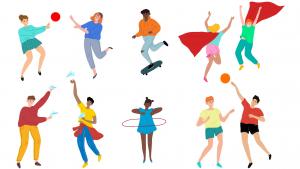Following the International Day of Play, it’s clear children value their free time. One theme to come out of The Big Ambition in relation to children’s free time was that children do not feel adults understand how children use recreational spaces.
Children use spaces in different ways to adults – that’s why as Children’s Commissioner I really want to see all the adults making decisions in children’s lives truly taking the time to think about the impact of these decisions. Children will know the shortcuts from school to town centres, and which routes to avoid; they will have found the perfect place to play ball games, or where they are discouraged from playing; they will know about places that feel scary or unsafe to them, that adults won’t be aware of.
The Big Ambition results showed that children said there are fun activities in their local area, but this was far from unanimous. Children discussed the need for more spaces for children to go where they can enjoy themselves and feel safe.
My young Ambassadors have shared their views on each of the themes from The Big Ambition, continuing with youth work:
Zara:
Children and young people often find themselves unsure on how to fill up their free time, with children usually resorting to mobile phone and game usage, and the rise of technology has seemed to make the reflex of reaching for games, videos and social apps seemingly unavoidable for young people.
The internet has its many benefits, namely its ability to connect people from around the world and produce communities of fun, inclusivity and kindness. However, some may argue that the internet stops people meeting an interacting with others face to face and making meaningful relationships with peers.
As children and young people who have been brought up with technology at our fingertips, I believe we need to stress the importance of balance, we need to experience the benefits of both online and ‘offline’ life. We need more spaces where young people can relax and connect with others, and with fewer people visiting leisure centres these youth centred spaces are needed now more than ever.
Mehul:
Some children in the UK might have a lot of free time in their life due to a number of reasons, but not all children have equal opportunities for leisure and recreation. Children’s free time is becoming more widely acknowledged as a crucial factor that affects their growth and well-being.
Many young people, especially those in more urban areas, face limited access to green spaces and recreational facilities. The lack of easily accessible outdoor areas limits opportunities for play and physical activity, and it exacerbates feelings of social isolation and alienation from the natural world for some young people.
In many cases children and young people use their computers to, phones, and tablets for amusement and gaming on a regular basis, and their social development, mental health and physical may suffer from excessive screentime.
Adults need to work together to offer young people more exposure to outside environments and nature, which have well known advantages for young people’s physical fitness, their mental health and their health outcomes. Making investments in the development and upkeep of inclusive and accessible recreation sites, like parks, playgrounds, sports complexes, and youth centres, would therefore prove to be an effective solution, especially in underprivileged communities.





